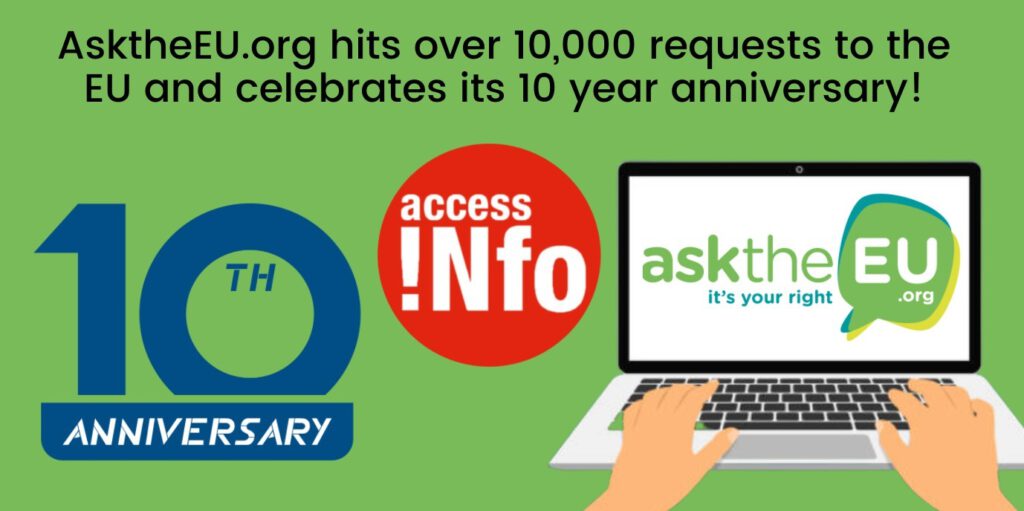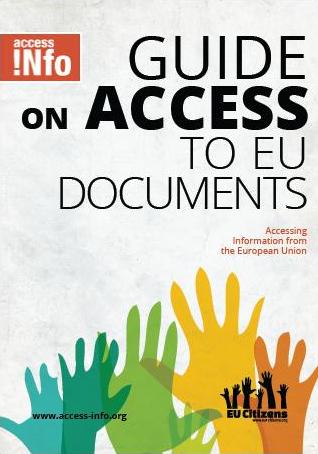Over the first decade of its existence, AsktheEU.org has built a strong reputation among EU civil society, journalists, and researchers.

Introducing civic tech into the EU transparency discussion
On 28 September 2011, the Spanish NGO Access Info Europe launched the AsktheEU.org platform at a European Ombudsman event marking the International Day for Universal Access to Information. It was a different time. The Council had just brought an appeal against the landmark Access Info Europe case concerning access to legislative documents, and the European Ombudsman was still the Greek academic Diamandouros.
At the time (and up until today), the European access regime was characterised by a hiatus that the AsktheEU.org platform sought to fill: the absence of a fool-proof, functioning and standardised access to documents request portal that pre-drafted parts of a request in conformity with extant -and for many non-experts, imponderable- access legislation (Regulation 1049/2001), and which kept track of legally binding deadlines. Both the impenetrability of the EU access regime and the failure of European institutions to adhere to deadlines were at the time coming to the fore as serious obstacles to the right of access to documents.
The AsktheEU.org platform intended to at least partially remedy these problems, by offering an easy-to-use, fully automated platform that directed requests to the right addressee (based on an in-built address book), and keeping track/reminding applicants of the passing of deadlines, as a sort of personal assistant. Moreover, all past requests, documents granted, and correspondence were to be openly accessible and searchable for interested members of the public. In order to realise these objectives, the platform ran on the Alaveteli open source software, developed and funded by the British NGO mySociety. This NGO was founded in 2003 to develop civic tech tools for various purposes. Currently, some 28 websites, including in different countries, run on the Alaveteli software.
A growing success story
Ten years later, AsktheEU.org platform has become an institution of its own among civil society actors seeking information about EU policy making. In the space of a decade, the portal has passed on 10,000 access requests, an average of over 1,000 per year, or 2.5 per day. This rate is clearly growing. In 2020, around 2,000 requests were filed via AsktheEU.org, while the 2021 figure until today is similar, with still three months to go until the end of the year.
In a testimonial, frequent AsktheEU.org users, including peace and lobby regulation activists and journalists from inside and outside of the EU, praise the portal for its user-friendliness, database searchability, and deadline tracker. Academics, among them those from the TrUE project associated with this blog, have also made frequently use of the portal for the collection of research data. According to Helen Darbishire, Executive Director at Access Info Europe and founder of the portal,
AsktheEU.org makes EU transparency more transparent and promotes the use of this right to increase public participation and make the EU more accountable.
At the same time, AsktheEU.org laments the obstacles that still exist to realising the full potential of the portal and the right of access in general.
In particular, the platform highlights the limited availability of information in languages other than English, French and German. Moreover, it points out that Frontex only accepts requests through a complex web-based access form that requires requesters’ ID (a controversial and disproportional measure that possibly infringes applicants’ privacy rights), while the Commission structurally requires applicants to provide a postal address. The latter is needed, the Commission argues, to verify compliance with the EU residency criterion for the exercise of the right to seek access to documents.
This blog has previously also experienced a reluctance to see through full correspondence of an access request through the AsktheEU.org portal, with the Commission preferring to correspond privately via applicants’ personal email. This diminishes the open-source character of applications that is the strength of the AsktheEU.org portal.
Finally, AsktheEU.org also observes that the current document application format of the European Medicines Agency is not compatible with its platform.
Mainstreaming the application experience through the institutions?
The success of the NGO-based AsktheEU.org platform might be considered to be inspired by the failure of the European institutions to provide a reliable platform of the same quality themselves. Indeed, the density of the EU’s online information presence, as well as the scattered and non-standardised nature of its various document and information registers has been previously lamented as a serious obstacle in the popularisation of the access regime.
At the same time, the inherent systemic complexity of government, and probably the EU particularly, also makes a frictionless and standardised experience of seeking transparency difficult to realise. In this reading, existing tools, including AsktheEU.org, may make the application process less cumbersome, but will inevitably remain primarily targeted towards a small, initiated expert segment of wider European society. This however does not discount the possibility that such elite actors can successfully rely on access to tools to act as “conveyor belts” passing on pivotal information to a diversity of societal constituencies.
In recent times, the EU institutions have made various attempts at improving their transparency and communication towards the wider public. An interinstitutional platform tracing legislative proposals and documentation, agreed in 2016, got stuck mid-process, and its outcome, 5 years after its announcement, remains uncertain. Earlier this year, the Commission itself announced various digital instruments to mainstream the transparency of its own documents and application process, in a project that is currently being rolled out. It also announced a controversial new communication policy regarding the conduct of press conferences.




